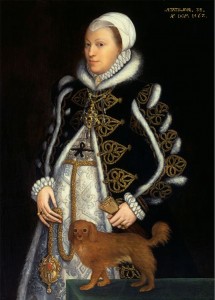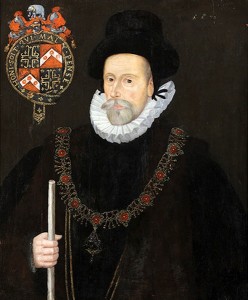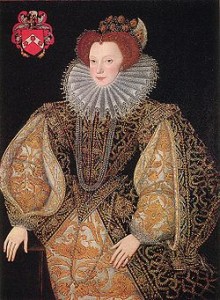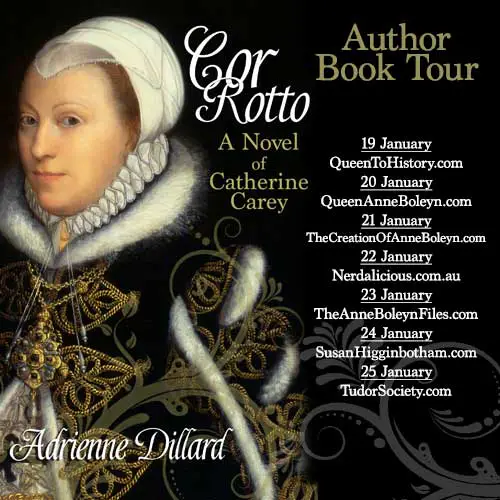 A big welcome to Adrienne Dillard, author of Cor Rotto: A Novel of Catherine Carey, who is visiting us today on Day 5 of her virtual book tour.
A big welcome to Adrienne Dillard, author of Cor Rotto: A Novel of Catherine Carey, who is visiting us today on Day 5 of her virtual book tour.
Thank you to Adrienne for allowing me to grill her on her thoughts about the Carey and Knollys families, families who are close to my heart and who I have got to ‘know’ through my own research. Adrienne does such a wonderful job at breathing life into them in her novel.
What are your thoughts on Mary Boleyn’s relationship with Henry VIII? Do you think that it was long-lasting?
I really go back and forth on this. Obviously we love the idea of the relationship put forth by novelists, but that doesn’t necessarily mean that it really occured that way. I kind of like to play “Devil’s Advocate” with myself on this. I definitely can agree with your idea that the very short-lived affair might have happened before Mary was married and was done and over within the blink of an eye. On the other-hand, we really don’t have a concrete date for their affair and, even though William Carey was very close to the king, we can’t rule out that the grants made in the early 1520s were not because of the affair with Mary.
I think the fact that it was known about and remarked on by people of the court points to it being longer than a “one-night stand” situation. Particularly because Henry was so discreet his affairs; the longer it went on, the harder it would have been to hide. I really don’t think it went on for much longer than a year or so and I certainly think it was over before Henry Carey was conceived. I believe that, if Catherine was in fact the king’s daughter, her conception most likely marked the end of the affair.
What are your thoughts on the paternity of Catherine and Henry Carey?
 I feel like there are some really good arguments that support and dismiss the king being Catherine’s father. Without even considering the grants that William Carey received or the uncanny physical resemblance that Catherine has to Henry, the fact that Catherine was sought for a very coveted position in the queen’s household speaks volumes, particularly after the spectacular fall of the Boleyns. And while I don’t believe that Henry was the king’s son, we do know that he was very well provided for even after 1536 so I think that it shows that the king held Mary and her children in some affection. However, there may be any other number of reasons for the treatment Mary’s children received. So, to answer your question, I do think Catherine was the king’s daughter, but I base it purely on circumstantial evidence and I am definitely not so set in that opinion that I can’t be convinced otherwise.
I feel like there are some really good arguments that support and dismiss the king being Catherine’s father. Without even considering the grants that William Carey received or the uncanny physical resemblance that Catherine has to Henry, the fact that Catherine was sought for a very coveted position in the queen’s household speaks volumes, particularly after the spectacular fall of the Boleyns. And while I don’t believe that Henry was the king’s son, we do know that he was very well provided for even after 1536 so I think that it shows that the king held Mary and her children in some affection. However, there may be any other number of reasons for the treatment Mary’s children received. So, to answer your question, I do think Catherine was the king’s daughter, but I base it purely on circumstantial evidence and I am definitely not so set in that opinion that I can’t be convinced otherwise.
You paint a vivid picture of Catherine’s loving relationship with her husband, Francis Knollys, what primary sources gave you insight into their relationship?
I would say the most valuable insights came from Francis’s own letters, not only to Catherine but also to William Cecil. During the time of Catherine’s illness, he seems almost desperate to come home and be by her side and he is very adamant to Cecil, even going so far as to speak a bit unkindly about the queen. Being such a devoted courtier, I think he had to be very emotional to be so blunt.

Elizabeth I appears to have been a volatile woman who was sometimes hard to be close to. How and why do you think that Catherine managed to stay close to her and serve her for so many years?
I think Catherine was very loyal and dedicated. By the time Elizabeth came to the throne, Catherine and Henry were the only members of the Boleyn family left so I am sure it was important to them to dutifully serve their cousin. As difficult as Elizabeth may have been sometimes, both families were very generously rewarded for their service to her. I think the three of them probably felt very duty-bound to one another as the last three remaining Boleyn grandchildren.
Another thought is that Elizabeth may have wondered about their paternity and felt it was prudent to keep them close to her. She had to constantly fight off other familial claims to her throne so it’s possible she was rewarding them in hopes that they would continue their loyalty. Catherine comes across as maternal and I think it truly extended to Elizabeth. Elizabeth was, for all intents and purposes, an orphan at a fairly young age and I think Catherine may have felt a responsibility for her even when she was being difficult. Perhaps more so during those times. She probably had a lot of practice with her own daughter, Lettice, who turned out to be an awful lot like Elizabeth!
It must have been heart-breaking for Francis Knollys to be separated from his wife when she was grievously ill, why do you think Elizabeth I would not let the couple be together?
I honestly don’t think Elizabeth believed that Catherine would die. There were a few times during that period where she would get sick, but she always seemed to rally and I think Elizbeth probably thought that was the case. We also can’t discount the importance of what Francis was doing. The Scots Queen was a real threat to Elizabeth and it really seems like Francis was the only person she trusted to look after her interests. It was a very unique situation. I don’t think she intended to be cruel, but at the time neutralizing the Scots Queen was a bigger priority.
Do the primary sources give us any insight into Catherine’s relationships with her children?

Hilary Mantel has recently spoken about the importance of accuracy in historical fiction, what are your thoughts on this? How did you approach your historical novel?
I think accuracy is of the highest importance in historical fiction. These are not “characters,” they were once living, breathing people and it is our responsibility to uphold their legacies. If someone were fictionalizing your life, wouldn’t you want them to be accurate?
There is certainly a place for fictionalized details because we obviously don’t know what people said or thought, but I think that the events we make up should have some basis in fact or at least be probable. In Cor Rotto, Jane Rochford suffers a miscarriage. Do I have any evidence to back up that she had one? No, not at all. Is it possible she did? Yes, certainly. We aren’t going to find a complete historical record of anyone’s life and we do still have to weave a story that will hold the reader’s interest, but I think that there is a lot we can infer from what information we do have that allows us to tell a credible story without slandering the reputation of our subject. Readers put their trust in writers to sell them something authentic. If a writer wants to make bold changes, at the very least they should let the reader know at the end of the story and give them a direction in which to search for more accurate history. I tried to keep as much historically accurate as possible and I think I probably went into overkill in my Author’s Notes but I wanted the reader to know exactly what was made up and why.
Are you working on a novel at the moment? If so, what about?
At this exact moment, I am not. However, in the next couple of months I will start researching my next project which will be a novel on Jane Rochford. She is so often painted as such a horrible person and I don’t think she has had a chance to tell her side of the story. She’s really been made into quite a scapegoat over the years and I think it’s time she got her due.
In your author bio, you mention your research on the American Revolutionary War and the sinking of the Titanic, will you be writing novels about those in the future?
I have considered writing a novel set during the sinking of the Titanic, but I haven’t given it much thought yet. I definitely need to consider an approach to it that hasn’t been done before. It seems like the story of the Titanic has been done excellently and from many different perspectives, but I definitely think that there may be more to discover. This summer I visited the Queen Mary in Long Beach, California and I kind of fell in love with Titanic all over again. As different as the ships are, it really did give you a small taste of the sense of what it might have been like to be on such a grand ship. As for the Revolutionary War, I’ve moved on a bit from that era at this point, but I think that once I’ve satisfied my Tudor obsession I would definitely be interested in revisiting both of those time periods with a view to witing about them.
Giveaway!
For your chance to win a copy of Cor Rotto: A Novel of Catherine Carey, simply leave a comment below saying why you’d like to read it. Leave your comment before midnight on Friday 30th January. I will email the winner shortly after.
Here’s the schedule for Adrienne’s book tour:
- 19 January – From Queen to History queentohistory.com/ – Guest article on Catherine Carey’s Early Life
- 20 January – QueenAnneBoleyn.com – Guest article on The Knollys Children
- 21 January – The Creation of Anne Boleyn www.thecreationofanneboleyn.com/ – Guest article on The Sanctity of Character
- 22 January – Nerdalicious nerdalicious.com.au/ – Q&A session with Adrienne
- 23 January – The Anne Boleyn Files (here!) – Q&A session with Adrienne
- 24 January – History Refreshed by Susan Higginbotham www.susanhigginbotham.com/blog/ – Guest article on the Cor Rotto letter
- 25 January – The Tudor Society www.tudorsociety.com/ – Guest article on Life in Exile

Cor Rotto: A Novel of Catherine Carey
The dream was always the same… the scaffold before me. I stared on in horror as the sword sliced my aunt’s head from her swan-like neck. The executioner raised her severed head into the air by its long chestnut locks. The last thing I remembered before my world turned black was my own scream.
Fifteen year-old Catherine Carey has been dreaming the same dream for three years, since the bloody execution of her aunt Queen Anne Boleyn. Her only comfort is that she and her family are safe in Calais, away from the intrigues of Henry VIII’s court. But now Catherine has been chosen to serve Henry VIII’s new wife, Queen Anne of Cleves.
Just before she sets off for England, she learns the family secret: the true identity of her father, a man she considers to be a monster and a man she will shortly meet.
Adrienne Dillard, author of Cor Rotto: A Novel of Catherine Carey, is a graduate with a Bachelor of Arts in Liberal Studies with emphasis in History from Montana State University-Northern.
Adrienne has been an eager student of history for most of her life and has completed in-depth research on the American Revolutionary War time period in American History and the history and sinking of the Titanic. Her senior university capstone paper was on the discrepancies in passenger lists on the ill-fated liner and Adrienne was able to work with Philip Hind of Encyclopedia Titanica for much of her research on that subject.
Cor Rotto: A Novel of Catherine Carey is her first published novel.
Adrienne’s book is available now from Amazon.com, Amazon UK and your usual bookstore.